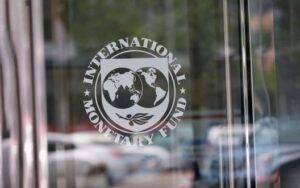
Yulia Svyrydenko, First Vice Prime Minister and Minister of Economy of Ukraine, and Peter Kmec, Vice Prime Minister for Recovery, Resilience and Use of European Funds of Slovakia, discussed the possibility of oil supplies through the Odesa-Brody pipeline.
“We discussed the situation at border crossings, bilateral trade, industrial cooperation, and energy. We are inspired by the implemented project to supply oil through Ukraine to Slovakia through the port terminal and pipeline from Odesa,” Svyrydenko wrote on Twitter (X).
According to her, Ukraine is also interested in providing Slovakia with natural gas storage services in its underground storage facilities (UGS).
As part of the Ukrainian delegation’s visit, Ukrtransnafta CEO Volodymyr Tsependa met with a representative of the operator of the Slovak section of the Druzhba pipeline, Transpetrol’s Chairman of the Board of Directors Martin Ruzhynsky.
According to the Ukrainian operator, the parties summarized the results of cooperation in 2023 and discussed plans for organizing transportation work for the next year.
“The results of the year demonstrate well-coordinated cooperation with our European partners. We want to maintain this result in the future, so we discussed all issues related to oil transportation in 2024, in particular, the modes of pumping through the Druzhba pipeline,” Cependa said in a statement.

International Monetary Fund (IMF) Managing Director Kristalina Georgieva has announced the creation of the Ukraine Capacity Development Fund (UCDF) to provide technical assistance with a budget of $65 million over five years, and the Netherlands, Japan, Lithuania and Slovakia have become its first contributors for a total of $14.5 million.
“We are looking for $65 million over five years to expand (Ukraine’s) capacity development in the priority sectors supported by the IMF program. I am pleased to announce that donors have already pledged contributions of approximately $14.5 million. I am confident in your support for this initiative,” Georgieva said after a ministerial roundtable on Ukraine, which took place as part of the annual meetings of the IMF and the World Bank, which ended on Sunday in Marrakech.
It is specified that the Netherlands’ contribution to the fund amounted to $7 million.
The official event to launch the fund on the sidelines of the IMF and WB meetings was attended by IMF First Deputy Managing Director Gita Gopinath, Finance Minister Sergii Marchenko, NBU Governor Andriy Pyshnyi and his deputy Sergii Nikolaychuk, as well as representatives of the four countries.
“These contributions will support the efforts of the Ukrainian authorities to stabilize macroeconomic conditions and restore the post-war economy while implementing comprehensive reforms that are consistent with Ukraine’s EU accession goals,” the IMF said in a statement announcing the creation of the UCDF.
Pyshny thanked the IMF for launching the new fund. He emphasized the importance of international financial assistance for Ukraine, reforming the Ukrainian economy, and strengthening the institutional capacity of the authorities.
Capacity Development Fund, JAPAN, LITHUANIA, NETHERLANDS, SLOVAKIA

NATO Secretary General Jens Stoltenberg has expressed confidence that Poland and Slovakia will continue to support Ukraine after the upcoming elections, despite recent harsh remarks against Kyiv, Reuters reported on Friday, September 29.
“I expect and I am confident that Ukraine and Poland will find a way to resolve these issues without negatively affecting military support for Ukraine,” Stoltenberg said in an interview with Reuters.
It is noted that Poland, a NATO member, was until recently considered one of Ukraine’s staunchest allies in its war with Russia, but relations with it deteriorated after Poland’s decision to extend the ban on imports of Ukrainian grain.
Slovakia, a NATO member, is also an ally of Ukraine, supplying military equipment, including MiG-29 fighter jets and S-300 air defense systems. However, opposition leader and former prime minister Robert Fico, who is leading in pre-election polls, has vowed to end this military support, Reuters emphasizes.
“Whatever the new government in Slovakia, we will continue to sit in NATO meetings,” Stoltenberg said, “and I am confident that we will find ways to continue to provide support – as we have done after every election in this alliance since the beginning of the war.

The opposition Social Democratic Party “Course – New Democracy” of former Prime Minister Robert Fico has won the parliamentary elections in Slovakia held on Saturday, the republic’s statistics office said.
According to data from 95.75% of polling stations, it gained 23.58% of the vote, while the liberal Progressive Slovakia party, led by Vice President of the European Parliament Michal Šimečka, received 16.37%.
As noted in exit polls, the far-right has apparently managed to overcome the five percent threshold, and will now be represented in the Slovak parliament.
Fico is known as a politician who opposes the continuation of arms supplies to Ukraine. He also claimed that the West’s anti-Russian sanctions are ineffective and promised to use his veto over Ukraine’s NATO membership application. Shimechka is his opposite, holding liberal and pro-Western views and promising voters to deepen European cooperation, The Guardian notes.

Ukraine will file a lawsuit with the World Trade Organization (WTO) against Poland, Hungary and Slovakia over their refusal to lift the ban on Ukrainian agricultural products, Taras Kachka, Deputy Minister of Economy and Trade and Ukraine’s trade representative, told Politico.
“It is important to prove that these actions are legally unlawful. That’s why tomorrow we will start the court proceedings,” Kachka said last Sunday, adding that Kyiv is preparing to take retaliatory measures against Polish fruit and vegetable exports.
Commenting on the introduction of unilateral bans by Poland, Hungary and Slovakia on Ukrainian grain after the European Commission’s decision to lift the restrictions, Kachka said that “in our opinion, these measures by Hungary and Poland are a statement of total distrust of the European Commission.”
Ukraine’s trade representative believes that the open defiance of Brussels by Poland, Hungary and Slovakia was not just an internal EU matter, but caused what he called “the biggest systemic problem” – whether international trading partners can trust what Brussels says on behalf of the EU.
“For many years, the European Commission has been the mediator in trade negotiations and the trade policy institution for the entire EU. And we are used to working on this basis,” Kachka said, adding that, in his opinion, “the systematic approach of Budapest and Warsaw to ignore the position of the EU institutions in trade policy will be a problem for the EU as a whole, because there is no unity here.”
Kyiv plans to sue the three countries at the World Trade Organization rather than through its own trade agreement with the EU. “I think the whole world needs to see how EU member states behave toward their trading partners and their Union, because it can affect other states,” he emphasized.
While Slovakia simply extended the EU’s previous ban on four types of grain, Poland over the weekend introduced additional bans on Ukrainian flour and feed. Hungary, according to Kaczka, is going even further and banning 25 more products that were not previously discussed, including meat.
“These arbitrary bans are ridiculous. I think that Hungary is making a political statement here that it wants to block trade with Ukraine and completely ignore Brussels. And that’s why I think this is a very bold move against both of us by Budapest,” Kachka emphasized.
While Hungary’s additional bans are mostly symbolic, given that Ukraine does not export much beef and pork to the country, Poland’s measures will affect a significant portion of Ukraine’s exports, Kachka said. If Warsaw does not lift these additional bans, “we will be forced to take measures in response to additional products and ban imports of fruits and vegetables from Poland.”
The governments in Budapest and Warsaw have said they are acting to protect their farmers from a surge of Ukrainian produce that has led to lower prices, but Kaczka denied that reasoning is flawed: “The Polish ban will not help farmers, it will not affect prices because prices are global – what they do is based on public opinion.”
An EU official told the publication that Brussels hopes to solve this problem by forcing Kyiv to impose its own export restrictions in the event of a sudden surge in exports.
When asked about this potential agreement, Kachka said that Kyiv is ready to “take responsibility for ensuring that exports from Ukraine do not cause a tsunami in neighboring countries” and will introduce a system of “real-time” grain export licenses for both countries, which will slow down exports to neighboring countries and allow Ukraine to “react quickly” if a surge is detected.
As reported, the ban on the export of wheat, barley, rapeseed and sunflower seeds from Ukraine to Poland, Hungary, Slovakia, Romania and Bulgaria, introduced on May 2 for the period until June 5, was extended until September 15.
On Friday, September 15, the EU allowed the ban to be lifted after Ukraine promised to take measures to tighten export controls to neighboring countries. On the same day, Poland, Hungary, and Slovakia imposed unilateral bans on imports of Ukrainian agricultural products. In addition to wheat, rapeseed, sunflower, and corn, Poland banned imports of cereals and flour, while Hungary expanded the list to 25 items.